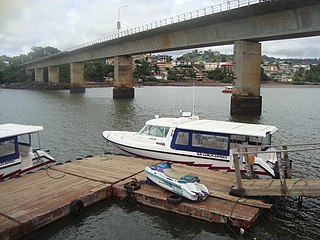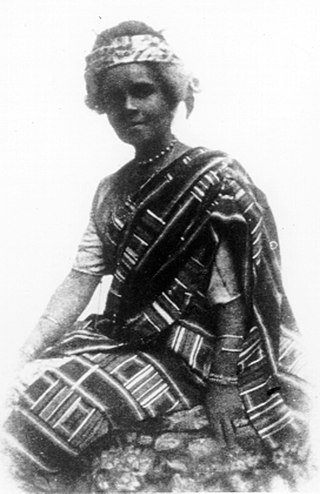Works
| | This section is empty. You can help by adding to it. (September 2020) |
Gaston Bart-Williams | |
|---|---|
| Born | 3 March 1938 Freetown |
| Died | 1990 |
| Nationality | Sierra Leonean |
| Occupation | journalist, film director, novelist, poet, diplomat and activist. |
Gaston Bart-Williams (1938-1990) was a Sierra Leonean journalist, film director, novelist, poet, diplomat and activist. He lived and worked mainly in Germany. [1]
Gaston Bart-Williams was born in Freetown on 3 March 1938 to Sierra Leone Creole parents. He was educated at the Prince of Wales School in Freetown and then Bo School in Bo. He founded the African Youth Cultural Society in 1958, and was Sierra Leone's delegate at the 1959 World Assembly of Youth in Bamako, Mali. [2]
From 1961 to 1963 Bart-Williams studied theatre direction in the UK under Clifford Williams. He won the London Writers' Poetry Award in 1962, and the Michael Karolji International Award in 1963. In 1964 he won a cultural grant from the German London Embassy. He settled in Cologne, where he worked as a freelance writer and film director. [2]
| | This section is empty. You can help by adding to it. (September 2020) |

Sierra Leone, officially the Republic of Sierra Leone, is a country on the southwest coast of West Africa. It is bordered by Liberia to the southeast and Guinea surrounds the northern half of the nation. Covering a total area of 71,740 km2 (27,699 sq mi), Sierra Leone has a tropical climate, with diverse environments ranging from savanna to rainforests. The country has a population of 7,092,113 as of the 2015 census. The capital and largest city is Freetown. The country is divided into five administrative regions, which are subdivided into 16 districts.

The Republic of Sierra Leone Armed Forces (RSLAF) are the armed forces of Sierra Leone, responsible for the territorial security of Sierra Leone's borders and defending the national interests of Sierra Leone, within the framework of the 1991 Sierra Leone Constitution and International laws. The armed forces were formed after independence in 1961, on the basis of elements of the former British Royal West African Frontier Force, then present in the Sierra Leone Colony and Protectorate. Circa 2010, the Sierra Leone Armed Forces consisted of around 13,000 personnel.
Sorious Samura is a Sierra Leonean journalist. He is best known for two CNN documentary films: Cry Freetown (2000) and Exodus from Africa (2001). The self-funded Cry Freetown depicts the most brutal period of the civil war in Sierra Leone with RUF rebels capturing the capital city. The film won, among other awards, an Emmy Award and a Peabody. Exodus from Africa shows the harrowing effort by the best of young African male blood to break through to Europe via death- and danger-ridden paths from Sierra Leone and Nigeria, via Mali, the Sahara desert, Algeria, and Morocco through the Strait of Gibraltar to Spain.

Freetown is the capital and largest city of Sierra Leone. It is a major port city on the Atlantic Ocean and is located in the Western Area of the country. Freetown is Sierra Leone's major urban, economic, financial, cultural, educational and political centre, as it is the seat of the Government of Sierra Leone. The population of Freetown was 1,055,964 at the 2015 census.

Bo, also commonly referred to as Bo Town, is the second largest city in Sierra Leone by landscape/geographical location and the largest city in the Southern Province. Bo is the capital and administrative centre of Bo District. The city of Bo had a population of 149,957 in the 2004 census and had a population of about 233,684 based on 2017 estimate. Bo is an urban centre, and lies approximately 160 miles (250 km) eastsoutheast of Freetown, and about 40 miles (71 km) to Kenema. Bo is the leading financial, educational and economic centre of southern Sierra Leone.
Syl Cheney-Coker is a poet, novelist, and journalist from Freetown, Sierra Leone. Educated in the United States, he has a global sense of literary history, and has introduced styles and techniques from French and Latin American literatures to Sierra Leone. He has spent much of his life in exile from his native country, and has written extensively about the condition of exile and the view of Africa from an African abroad.
Emmanuel Bankole Timothy was a Sierra Leonean journalist. He was also an author and wrote biographies of Albert Margai, prime minister of Sierra Leone (1964–67), and Kwame Nkrumah, president of Ghana (1960–66). Timothy served for many years as editor of the Daily Graphic in Accra.

Adelaide Casely-Hayford, MBE, was a Sierra Leone Creole advocate, an activist of cultural nationalism, a teacher and fiction writer and a feminist. Committed to public service, she worked to improve the conditions of black men and women. As a pioneer of women's education in Sierra Leone, she played a key role in popularizing Pan-Africanist and feminist politics in the early 1900s. She set up a Girls' Vocational and Training School in Freetown in 1923 to instil cultural and racial pride for Sierra Leoneans under colonial rule. In pursuit of Sierra Leone national identity and cultural heritage, she created a sensation by wearing traditional African attire in 1925 to attend a reception in honour of the Prince of Wales.

Mass media in Sierra Leone began when the first modern printing press in Africa arrived at the start of the 19th century. In the 1860s the country became a journalist hub for Africa with professional travelling to the country from across the continent. At the end of the 19th century the industry went into decline and when radio was introduced in the 1930s this became the primary communication media. Print media is not widely read in Sierra Leone, especially outside Freetown, partially due to the low levels of literacy in the country. In 2008 there were 15 daily newspapers in addition to those published weekly. Among newspaper readership young people are likely to read newspapers weekly and older people daily. The majority of newspapers are privately run and are often critical of the government.
John Joseph Akar (1927–1975) was a Sierra Leonean entertainer, writer, and diplomat. He served as Sierra Leonean ambassador to the United States. Today, he is probably best known for composing the music of Sierra Leone's National Anthem.
Yulisa Amadu Pat Maddy was a Sierra Leonean writer, poet, actor, dancer, director and playwright. Known by his friends and colleagues as Pat Maddy or simply Prof, he had an "immense impact" on theatre in Sierra Leone, Nigeria and Zambia.

The Ahmadiyya Muslim Community is the second-largest sect of Islam in Sierra Leone, behind only Sunni Islam. The earliest history of the Community in Sierra Leone dates back to the early period of the Second Caliphate, when at least six people are said to have conveyed their adherence to the faith. The sect attained rapid growth in the country after the 1937 arrival of Nazir Ahmad Ali, the first permanent Ahmadi missionary in Sierra Leone. Recent estimates by Ahmadi community suggest that there are approximately 560,000 Ahmadi Muslims in Sierra Leone, which is about 9% of the country's total population. Sierra Leone has the largest percentage of Ahmadi Muslims by share of total population in the world.

Sierra Leone, officially the Republic of Sierra Leone, is a Constitutional Republic in West Africa. Since it was founded in 1792, the women in Sierra Leone have been a major influence in the political and economic development of the nation.
The following is a timeline of the history of the city of Freetown, Sierra Leone.
Literature of Sierra Leone is the collection of written and spoken work, mostly fictional, from Sierra Leone. The coastal west-African country suffered a civil war from 1991 until 2002. Before the civil war, Sierra Leone had many writers contributing to its literature and since the end of the war the country has been in the process of rebuilding this literature. This is an overview of some important aspects of the literature of Sierra Leone before, during, and after the war.

The Sierra Leone Creole people are an ethnic group of Sierra Leone. The Sierra Leone Creole people are descendants of freed African-American, Afro-Caribbean, and Liberated African slaves who settled in the Western Area of Sierra Leone between 1787 and about 1885. The colony was established by the British, supported by abolitionists, under the Sierra Leone Company as a place for freedmen. The settlers called their new settlement Freetown. Today, the Sierra Leone Creoles are 1.2 percent of the population of Sierra Leone.
Zach Niles, is an American filmmaker and film producer. He is best known as the director and producer of the critically acclaimed film Sierra Leone's Refugee All Stars. Apart from acting, he is also a strategist, entertainment producer and a social justice advocate.